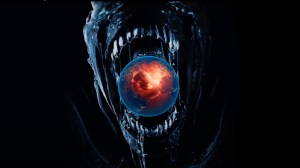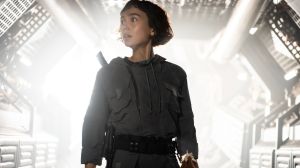Filmmaker Ridley Scott changed the entire landscapes of both sci-fi and horror in 1979 when he released Alien into the world. Nearly 50 years later, many audiences still consider that debut entry the benchmark by which to measure all successors. The franchise has expanded in various ways since then, including sequels, cinematic crossovers, comic books, and video games, but Alien is about to head into uncharted territory with its first live-action TV series, Alien: Earth. A lot could be riding on such an expansion, as such an extension of a beloved concept could be a make-or-break adventure for some filmmakers, but for creator Noah Hawley, who previously delivered adaptations Legion and Fargo, it’s only the latest exciting reimagining in a long line of beloved revivals. Alien: Earth lands on FX on August 12th.
Videos by ComicBook.com
“Those first two movies, which are really my bellwether that I’m going against, the first one is such a ’70s movie, and the second one is such an ’80s movie,” Hawley shared at a press event at which ComicBook was present regarding his approach to the project. “The first film, really, space truckers, it has that blue collar — these are people who work for a living. The second film, they’re grunts. You introduced Paul Reiser, but he’s middle management, at best. I wanted to keep some of that identity, which we get in through Alex [Lawther]’s character, Hermit, and the grunts that he’s with. I also felt like we had to see now what the level above is, and so the trick was to try to figure out how to show the elite while still holding that tone of voice. I also feel like that first movie, with Yaphet Kotto and Harry Dean Stanton, it’s a little bit Waiting for Godot. We’re going to a place, we don’t know where, to do a thing, we don’t know what, for people we don’t know. There’s a little bit of that individual getting lost in the system that I think is a big theme for us.”
FX officially describes the series, “In the year 2120, the Earth is governed by five corporations: Prodigy, Weyland-Yutani, Lynch, Dynamic and Threshold. In this Corporate Era, cyborgs (humans with both biological and artificial parts) and synthetics (humanoid robots with artificial intelligence) exist alongside humans. But the game is changed when the wunderkind Founder and CEO of Prodigy Corporation unlocks a new technological advancement: hybrids (humanoid robots infused with human consciousness). The first hybrid prototype, named ‘Wendy,’ marks a new dawn in the race for immortality. After Weyland-Yutani’s spaceship collides into Prodigy City, ‘Wendy’ and the other hybrids encounter mysterious life forms more terrifying than anyone could have ever
imagined.”
While certain elements of the big-screen franchise have depicted the priorities of massive corporations, largely in how disposable they perceive human life, Hawley is diving even deeper into these realms.
“I don’t think that in the ’80s and the ’70s they could have envisioned the Elon Musks of the world at that point,” the writer confirmed. “We’re in a different era and I felt like, in order to make it feel contemporary, we needed to address that idea that this whole thing is the whim of Prodigy, and what you get in a corporation is a diffused decision system, where nobody actually decides. It’s nobody’s fault and therefore it doesn’t have to be a human decision. I think what we’ve reached now is something worse in a way, which is that … I think about that Twilight Zone episode where there’s the kid who has all the powers and everyone around him has to act like all they want to do is make him happy and keep him happy. There’s something so awful about having to please someone who doesn’t have a rational view of the world or is subject to whim. I think that’s the spin on it that we brought to it. The Weyland-Yutani side is more of that corporate identity.”
The Alien franchise is deservedly known for birthing one of the greatest movie monsters of all time with the xenomorph, and while the iconic creature is set to make an appearance in Alien: Earth, much like how Ridley Scott returned to the franchise for two prequel films that dove deeper into the world’s mythology, those beasts are just the tip of the iceberg.
“When I do these adaptations, which I’ve been asked to do a couple of times now, I just try to figure out what the original made me feel and why, and then try to make you feel similar things while telling you a completely different story. When I look at that first movie, it’s not just a monster movie. It’s about humanity trapped between the primordial parasitic past and the AI future and they’re both trying to kill us,” Hawley explained. “To the degree that it’s a TV show, it’s multiple hours of a story. Even if I have 60% of the best action or horror on TV, I still have 40% of, ‘What are we talking about?’”
He continued, “I like that idea of picking a moment in Earth’s history, which is a bit like the Edison, Tesla, Westinghouse moment, where everyone knows that electricity is a thing and everyone’s fighting to control it, so I like this idea that we have artificial intelligence, everyone’s trying to figure out how humanity transcends to the next level. Artificial intelligence, is it enhancing the human body mechanically or is it this transhuman idea? That felt like a really interesting conversation to have, to then bring the monsters into it, because the show and a lot of science fiction is really about the idea of, does humanity deserve to survive? If you remember, Sigourney Weaver in the second movie, she’s like, ‘At least they don’t f-ck each other over for a percentage.’ So to be able to bring in not just the physical or the body horror, but to bring in that moral horror of humanity, the things that we do to each other, was really a driving force.”
Even though the series is exploring bigger ideas than just running away from a creature, don’t worry, there’s plenty of xenomorph mayhem.
“It’s the dynamic of what makes something cinematic. It’s the moment that you add in the visual storytelling of horror or action,” Hawley pointed out of the role the monster plays. “You’re expanding the amount of time it takes to shoot these things, and we have some very big set pieces that require a disproportionate amount of our shooting schedule compared to the amount of screen time. You just have to work all that stuff into it. Certainly, in the design phase with Wētā, I didn’t want to mess with the silhouette of the creature at all. I felt like the audience wants that classic [creature], but then within that, I felt like I wanted to experiment with a couple of ideas about the creature and ways in which … because I always felt like it was the least effective when it looked like a guy in a suit. There are elements in the classic — there’s just this big rib cage, which feels very human to me.”
He added, “I wanted to try to minimize that and play around with some other ideas. That was a very fun process to work on with Wētā, but the facehuggers, I don’t want to mess with that at all. You want that to fit the original. And then [there are] some coloration issues with what color it is. It’s very black in the movie and I wanted to play into more of the bug-like quality of it, so maybe it falls a little more in the roach coloration. You can get in trouble for keeping it the same and you can get in trouble for changing it, so I figure I’ll just be in trouble for whatever.”
Alien: Earth marks a first for the franchise not only for being the first live-action, long-form TV show set in this world, but it also marks the first time an entire adventure unfolds on Earth, outside of the crossover Alien vs. Predator.
“None of us have ever been in space. I think what Ridley managed to do in that first film was to create a workplace that we could identify with, because it might as well have been a factory for all that we knew on the inside,” Hawley explained. “That made it recognizable and very different than Star Trek’s Apple Store aesthetic or even the Star Wars, just ripping-yarn adventure tale. It felt real. Everything was dripping, it was rusty. It just felt real to us here on Earth. Also, one of the things that all the movies share in common is that they’re all trapped in a spaceship prison and I wanted to expand outside of that. You have to have layers of containment, but you also, by expanding the purview of it, you expand the risk of it, as well, because we know that to go from just a small outbreak to a global phenomenon can happen very, very quickly.”
A key fixture in Hawley’s approaches to any adaptation in a beloved property is to find a way to bend the rules of expectations without entirely breaking them. Fargo and Marvel’s Legion have their fan bases, yet those might not come with the same expectations as Alien.
“You’re making the show for an audience and you want the audience to be happy. I respect my audience and audiences are very sophisticated now,” the filmmaker confessed. “I always looked at it like with Legion — I think when you take six issues of a comic book and you call that your series or your movie, then invariably you have to change a lot of things. I think that makes an audience angry, fans of the comic, but I always felt like, ‘Here are the characters you love and I’m just going to tell you new stories about them,’ and my hope was that everyone would be so happy to have new stories that they wouldn’t be as angry.”
He joked, “I do have a friend who worked on one of the Star Trek shows who said, ‘Nobody hates Star Trek more than a Star Trek fan.’ You just have to manage that, but it is a very different audience and certainly a different audience than Legion, also, in a way. It’s a very different story with its own tone of voice. I have no desire to make it funny, let’s say, or make it weird for weirdness’s sake. Within that, I think what I’m always looking for is specificity in the character details and the design aesthetic, those kinds of details. I don’t know anyone else who gets to make Fargo and Alien in the same year, so I feel very lucky about that.”
The franchise as a whole has largely focused on adult characters, given the nature of how they find themselves in terrifying scenarios, though Alien: Romulus focused on younger characters than previously seen and Aliens highlighted how the young Newt could evade the xenomorphs. Alien: Earth features its fair share of adult characters, but also explores the idea of child-like consciousnesses being transferred into synthetic bodies.
“We’re also playing a lot with the idea of children and adults and what it means for a child to become an adult. If you take a child’s mind and you put it in an adult body, that doesn’t make it an adult, and so much of that process of growing up is biological. It’s hormones and the physical restructuring of your brain, and so you have to simulate adolescence in some way,” Hawley recalled. “That’s interesting to me in terms of the 40% of what we are talking about. Also, having a now-teenage daughter, that process between girlhood and young adulthood, on some level, there could be … there’s either a desire to grow up too fast or a reluctance to grow up. Both of those are really interesting to explore, what it means to suddenly find yourself in an adult woman’s body or an adult man’s body, compared to what you had before.”
He continued, “The things that I’ve said about this conflict between biology and the synthetic, which is what humanity is trapped between, and does humanity deserve to survive? Then the thought, ‘Well, who’s more human than a child?’ Because they don’t know how to pretend they’re not scared, they’re bad liars. Then you think, ‘Okay, well, James Cameron’s movie, it has a literal child in it, but she’s so much more mature than Bill Paxton, who’s like a child in an adult’s body.’ So I think, ‘Well, that tone of voice is available to me because it is in those, I’m going to use it in a different way, but “Game over, man,” that childishness in an adult setting from an adult.’ Then the poise of the child, those elements, you can’t divorce those from James Cameron’s movie, and so that’s interesting to work in there. This idea that adult minds are too fixed to make the transition, and so children’s minds are more flexible, they’re literally changing where in your physiognomy that your rational, your executive function is. So it just felt like that was there to explore.”
Alien: Earth lands on FX on August 12th.
Afre you looking forward to the new series? Let us know in the comments below or contact Patrick Cavanaugh directly on Twitter or on Instagram to talk all things Star Wars and horror!











